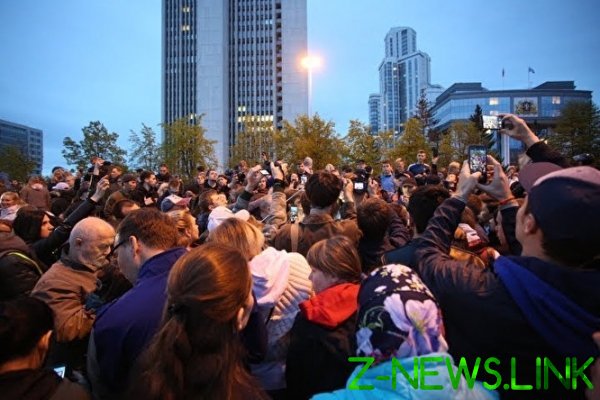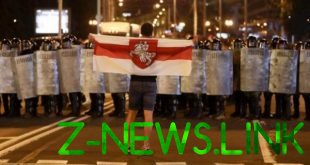
“Humiliation is unbearable”
Patience people the limit is reached, the protests will grow. Lecture by Lev Gudkov (“Levada-center”)
Lecture of Director of the “Levada-center” Lev Gudkov “Angry society: public opinion in 2019”, held in the Yeltsin Center, expected was a full house: only a couple of hundred meters away has died down a crowded public protest that will go down in the history of Yekaterinburg and Russia by the short and energetic “For the Park.”
Starting the lecture, Lev Dmitriyevich noted that the discontent of the population socio-economic policy of Putin and a feeling of approaching the impasse began to accumulate from 2015, with the sharp decline of the ruble, and the beginning to visibly emerge by the end of 2017. “The presidential campaign and the world Cup briefly extinguished the mood. But the signing of Putin’s pension reform has dramatically fallen off all the indicators. More than 90% of the population extremely negatively assessed the draft law, considering it a violation of a tacit agreement between people and government, and to put it simply — robbery”, — said the sociologist.
“The mood of protest has declined quite strongly”
Encountered two ways of looking at retirement. One Soviet, he divided our bosses, authority: pension is compensation of loss of capacity with age, the state determines the extent of this loss and, accordingly, assigns or other relief. The amount of compensation systematically decreases: if in Soviet times the ratio of pension to average salary amounted to 60-65%, now in different years, depending on the economic situation, 29 to 32%. Retired very hard to live with.
Second look — those who after retirement was going to continue to operate for about another five and a half years, which is slightly more than half of retirement age. It is, as a rule, people are better educated, more skilled, not engaged in physical labor (those who engaged in physical labor, so exhausted that their health status does not allow them to continue to work).
If not take Rosstat data, our data, the average salary in the country amounts to 38 thousand rubles, but more than half [of this material layer] get paid no more than 25 thousand the bulk of the lives of the extremely poor. Given that about 70% of our population has no significant savings or have savings, which I call “insurance reserves”, that is, those in which the family can survive 2-4 months for this category, salary in addition to pension, a very significant increase. Thanks to her in the family budget have additional income that enable the family to do some kind of maneuver.
Raising the retirement age denies this possibility, and that is why it is considered a violation of a tacit agreement between society and the authorities, causing extremely severe reactions. It is clear that in accordance with [official] information policy of the state is in a difficult position: waging war in the Donbass and Syria, implementing the rearmament of the army, increases the cost of the state apparatus, the police and so on, money is not enough. But, as our interviewees, “why should this happen at the expense of us?” Last summer, 53% of respondents were ready to take to the streets to protest against pension reform, if there is, where they live, would be held such demonstrations.
But in August — September, the authorities have taken serious measures to stabilize, to prevent the consolidation — through criticism of the protest organizers, preventive detention and arrests through the exhibiting organizations-spoilers, of trade unions, which made rallies and demonstrations. But confidence in them was not, and on this background, the protests began to subside, today they fell pretty hard.
The same with political demands: first, the protest jumped, but could not resist and fall down. And the power is slightly stepped, for example, lowered the age of retirement for women.
“Most devoid of a sense of perspective that the country is going somewhere”
Besides economic, there are social factors that are causing concern, anxiety, fear about the future nearest. The first [experience] is due to the fear of diseases of children and loved ones. It’s not a fear of a particular illness, but an expression of the fact that for people the most important thing, only in a negative form.
In the second place the fear of a major war. The fact that the euphoria and militaristic sentiment associated with Crimea and confrontation with the West, except some self-satisfaction, sense of power, pride that we once again become a great power that we once again feared and respected, as was respected of the USSR, created a sense of uncertainty, not articulated and are not expressing, this is the other side of Patriotic enthusiasm. Implicitly, people began to say, and what to pay? And this fear is very strong.
On the discussion and the focus groups that we conducted, people said that we have entered a third world war, but in its cold phase, 56% said that they are very afraid of war. It’s a combination of pride and nekanonicheskogo fear was the emotional background of the last years.
After the fear of war — the uncertainty of the future, expressed in the form of fear of disability, to poverty, helplessness, and, interestingly, natural disasters. After all, we cannot say that we live in an area of extreme situations — earthquakes, hurricanes, epidemics and so on. Fear of natural disasters is an expression of the background of fear, diffuse, non-articulated, which suggests very strong sense of vulnerability, and in front of it — people can not say.
Well, more articulated — the fear of arbitrary government and chronic lawlessness.
Positive evaluation — satisfaction, self-esteem, responsibility, hope, confidence in the future, the freedom, the pride of the people give two groups: officials and businesses affiliated with the government (along with family members is quite tangible, measurable groups), and youth. In force age peculiarities, the natural optimism of the young feel that they have something unlike the parents of the losers, will succeed, they will live better. So until recently, young people were the most Pro-Putin group, the situation began to change literally in the last two years.
Clear idea of the future — not more than 20%, most devoid of a sense of perspective that the country is going somewhere. If at the end of 80-ies of the characteristics of the great powers treated developed economy, great culture, and literature, achievements in science and space, today, according to April this year, there were only three components of the national self — respect- the vastness of the territory, mineral riches and military power.
I would call it existence in the “and so on”: in the best case, “tomorrow is today”, “the main thing that tomorrow was worse.” In General, people live for a short time horizon, with anxiety and uncertainty, insecurity. If you add such components as, on the one hand, fear, despair, resentment, envy, resentment, bitterness, aggression, that is what in sociology is called resentment, and other feelings of depression, fatigue, confusion, hopelessness, loneliness, we receive more than 50%. Here the emotional background that accompanies people’s daily lives.
And basic setting life strategies — passive adaptation, adapting to the circumstances unchanged. People think we should tolerate, and this is the main wisdom. According to surveys, 56-60% say: life is hard, but bearable.
“People do not see the means and opportunities to influence policy”
Here in mass consciousness occur very negative assessment of the present and at the same time a very strong idealization of the Soviet past, when “there was order, there was no corruption, everyone had a job when healthcare and education were free.” Two interrelated processes, the same mechanism, that is, critical assessment of what is happening in the present is impossible without a powerful idealization of the past. Especially those from the poorest social groups, as the rural population, the population of depressed provincial towns, where very high rates of social pathology — alcoholism, crime, very high suicide rate.
At the same time — which is very important — people don’t want to take responsibility and to change their lives, particularly in politics. It is an expression of opportunism. Due to the experience of Soviet life, adjust to the repressive state: keep your head down, be invisible. Or, as formulated one of my co-author: “pretend to be inedible.”
Not interested in politics, primarily because people do not see the means and possibility to influence it, those who make the decisions: there is no political party, public organization that could represent their interests. The closer to your own daily life (meaning family, surrounding, yard work), the greater the measure of responsibility, primarily for the life and welfare of loved ones, 30-40% think that can have some influence. On the level of city, region, country, 85% say they are not able to influence the decisions that “nothing can be done.” And it demobilized.
Besides, remember the failure of the protest movements in 2011-2013. Actually, this was one of the reasons for the split of protest: a large part of protesting or supporting the protest slogans joined the Crimean majority, joined the notorious 86%, a minority remained in isolation.
“The company increases the degree of awareness of their own dignity”
The prospect of expressing dissatisfaction is very weak, for them no. Does this mean that the protests gone? No, it means that they have passed into the chronic diffuse state of General irritation, extreme discontent. In certain groups there comes a limit to patience. Disrespect, insults, humiliation of human dignity become unbearable. And either lose himself and remain under the tyranny of the government, which brazenly takes and pushes its solutions, or “square”. For certain groups the impossibility of humiliation becomes a catalyst is not less acute than the drop in income or the unavailability of medicines. This means that the company increases the degree of awareness of their own dignity.
In General, the number of local protests is extremely high. The high rating of Putin is accompanied by a profound belief in the total corruption of the entire system. According to my rough calculations, every day, three to five reports of corruption scandals, criminal cases on corruption. Hence a deep conviction that the money in the country, but they are rated a selfish, greedy power. And to do it with anything. And can no longer be tolerated, for health reasons. Therefore, the local flash protests, speeches. The number of protests is multiplied because it is a form of manifestation of irritation of society, finding the ways of solving conflicts. Center for labor studies [Higher school of Economics] said that the number of strikes and labor disputes increased over three years by 1.7 times.
A very serious increase. But it is diffuse, we are dealing with a society in which the expression of group interests suppressed the protest does not turn into a legal, democratic and responsible movement, in part because these events do not fall on the Federal channels and do not become property of public opinion. They deliberately sterilized, are displaced.
The domination of [the current government] are not based on direct violence, as it was in the times of the totalitarian system has no such large-scale repression, they are chiseled in nature and are used against some activists and officials. Domination is based on the processing of mass consciousness. The most “draw” the media is the Federal channels. Of the 22 Federal channels 20 integrated three to four media company and are closely linked, their assets are intertwined, VGTRK, “Gazprom Media”, “national Media Group” conduct a coherent policy and in fact control the media.
Audience share of the alternative media (I call them that because we have no independent, censorship is present in almost all editions “Novaya Gazeta”, “Vedomosti” and so on) is 8-10%, the rest are subject to and controlled. So people can’t log out propaganda.
And if to analyse its content, it turns out that there are no new ideas. All the techniques and abstracts of advocacy has developed, at least in the early 40-ies, if not sooner. The arguments that were used against the Crimea and the Donbass, word-for-word reproduce the arguments that were used in the Finnish war. Propaganda creates new ideas, new ideas.
“There is a moral necrosis, the inability to have empathy, empathy”
In the late 80’s-early 90-ies Stalin was perceived unambiguously negative. Was the sharpest criticism, and extremely superficial, not involving the entire totalitarian regime. Stalin acted as the initiator of the terror, mass repression, as a pathological personality. In 1988-1989, in a positive sense, it was mentioned 10-12%, most believed that Stalin was a villain, he’d be forgotten after 25-30 years and no one but historians will not remember. These were typical answers. Even amid the crisis deepens and frustration in the reform Stalin’s rating rose very slightly.
Destalinisation, increase positive attitudes towards Stalin are associated with changes in government policies. Stalin’s rating has risen with the arrival of Putin and kept since then. Putin is one of the first statesmen proposed a toast to Stalin as the organizer of Victory — may 8, 1999 in the Kremlin, at a reception in honor of the release of Kremlin cadets.
Re-Stalinization took place very skillfully. The recognition of the [respondents] of the positive role of Stalin does not mean the desire to live “under Stalin”. Therefore, no one is saying that there was no mass repression and terror. [The authorities] say: every country has its dark spots, we have nothing to be ashamed of, it doesn’t have to close positive in the figure of Stalin, his achievements as organizer of Victory. This is one argument, the second: only an iron hand could turn a peasant country in the strongest nuclear superpower. In other words, modernization and Victory serve as a justification in hindsight of all the crimes of the red terror, collectivization, repression, which have made the Soviet government in relation to the population. This is something that is attributed to Churchill: Stalin found Russia with a wooden plow and left with a nuclear bomb. “Stalin — the effective Manager”. (In this context, we are dealing, of course, not with the biography of a specific person, but a myth based on such key points as the upgrading and Victory.)
Appropriating the right to speak on behalf of all, the government thus argued that better understands and knows that it is necessary for the people than the people themselves. For this it was necessary to neutralize the concept of massive repression. And it succeeded — thanks to the propaganda and education. Currently, 68% say that Stalin was responsible for the deaths of millions of innocent people, and the same 60-65% say that without Stalin there would be no Victory. Growing justification of Stalin’s crimes. If in the late 80’s-early 90-ies a large part of the believed that the number of victims of mass repressions of tens of millions of people (this is an exaggeration: according to historians, passed through the GULAG 17-22 million), today more than half believe that “nearly a million”. Is a sharp understatement of the scale. As they say in the polls, “only a million”. The mass consciousness under the influence of propaganda makes a reassessment and solves the equation, weighs in the balance: the Victory, the formation of the Soviet Union as a superpower — is it worth a million lives? And two-thirds of respondents say that they search for those responsible for repression is not necessary.
The same process of social psychologists and psychoanalysts have observed in postwar Germany: repression of the past in an understatement of the crimes that were committed at that time, if they had never existed.
This is the hardest thing — moral necrosis, lack of sympathy, empathy, to putting yourself in the place of others.
It is important that this is a generation that doesn’t want to identify themselves with in the meantime: we are different, we are normal, we don’t “scoops”, we have nothing to do with the past, we live in another country, we have mobile phones, we know the languages, we see much more. For them, the same Stalin, Genghis Khan or Ivan the terrible — a bygone era. And they don’t understand that reproduce the preconditions for totalitarianism — repression of the memory of the repression, opportunism, and opportunism. They don’t notice it, they do not notice atmospheric pressure, and do not want to miss.
“When you no longer rely on anyone, all hopes are concentrated on a single person”
How all this affects the relationship to power? By the end of 2013 amid mass protests in the largest cities, 61% of respondents said that they are tired of waiting for Putin’s promises, and 47% wanted to see him in the next presidential term, that they want a completely different figure from the other camp and with another program. But anti-Ukrainian wave, the wave of propaganda and confrontation with the West restored the rating of Putin and raised him to the limit values. Then the pension reform has been dropped, and now he rests on a stable base, at about 61-66%, provided the entire system of control, propaganda and political system. This means the weakness not only of civil society but of the whole institutional system: when to hope any more on whom all hopes are concentrated on one person, on the myth about one piece.
What else provides the stability [of Putin’s rating], is the relocation of discontent and irritation to other levels of government and other shapes. The original Medvedev’s rhetoric (“freedom is better than unfreedom”, “we are building a legal state”, “modernisation” and so on) first greatly raised the hopes and support, people thought he was really going to change Putin’s course. But when it became clear that this figure is dependent and secondary, has again raised dissatisfaction. Crimean history at some time removed the annoyance, but still an assessment of the activities of the Prime Minister today is extremely negative. The old principle of the “good Tsar — bad boyars”. The discontent is transferred not only Medvedev, but also on the activities of the government, the state Duma and so on.
“People don’t trust anyone, that the legacy of the Soviet time repressions”
(answers to questions from the audience)
— If the socio-economic situation of the population will not deteriorate and will remain the same, Putin can count on the current 60 percent support?
— In the interval six or seven years of support will decline, but in the coming years is unlikely. Because the popularity and approval of Putin holding on two factors. The first is the lack of an alternative. The political field is parched, the other leaders who could compete with Putin, no. In focus groups we keep saying, who else? The second factor is the hope, the belief in a miracle: and suddenly he will take the country out of crisis, as managed in the early 2000s? Illusion — the most durable material social construction. The illusion did not require confirmation, people want to believe, that’s all. If you can’t afford to change the situation, what remains?
How it is stable? There is a slow erosion. It is constrained by the entire system of propaganda Putin is 75% of the total news time. If a slow drop in revenue will continue, will accumulate not just irritation, and acute dissatisfaction. The Russian economy is simple and unstable. And if you break out the global crisis, will be a drop in the price of oil (and some economists talking about it), the process is dramatically accelerated. Or if there is an escalation of the military conflict, is not far away, somewhere in Syria, and about our borders, and this will end badly, it will also be the catalyst for the deterioration. But that still doesn’t mean the change [of ruler]. Asgardia after all, something created. “If stars light — means, it is necessary for somebody”. But until I have reasons for [the political crisis] do not see.
— That is, if the government itself will not create problems for ourselves, problems for it does not exist?
— The situation in Yekaterinburg — as one of those times.
— Political scientist Valery Solovey predicts that in a year and a half, the number of protests will increase speed. Your rating?
— Valery Solovey predicted this a long time ago, but so far his predictions don’t come true. In principle, I agree with him: the protests will continue to grow, the number of performances will increase.
The problem is social solidarity, the ability to turn the local discontent into an organized movement. Mass psychology prevents it. Strategy and experience of adaptation, adaptation prevents this possibility. There is a very strong internal resistance, reflected in a negative attitude towards activists, besides Bulk. It is perceived as a provocateur, troublemaker, generating trouble. In 2011, his slogans were supported by more than 40 percent, today — at the level of 4-6%.
Moreover, in society there is a huge lack of trust, people don’t trust anyone, a legacy of Soviet-time repressions. With the departure of the intelligentsia as an institution we have not had a reputable group, moral, intellectual authority that can be trusted.
— Based on the fact that people sympathetic to the Soviet past, what kind of leader demanded by them?
Is a set of vague wishes. He must be honest, uncorrupted, decisive, just, caring about people. In General, the father of the people.
A group of sociologists under the leadership of Sergei Belanovsky pikiruyuschego sympathy for Lenin. Maybe it’s Lenin?
— Lenin headed the list of the greatest men in 1989, then as such it was called 72% today — 32%. This is lower than that of Stalin (38%), Pushkin and Putin (34%). The Soviet Pantheon was gone, along with Marxism, Marx and Engels, all the old Bolsheviks almost disappeared from the public view.
In preparing the material participated Yuri Grebenshchikov.
Thank you for your support of Oleg lutohin and Alexandra Zagryazhskaya (Yeltsin Center).
© 2019, paradox. All rights reserved.





